Fiction
Nonfiction
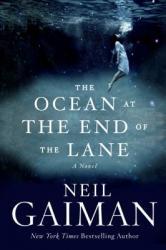
The Ocean at the End of the Lane is set when the protagonist returns to his childhood town for a funeral. He drives aimlessly down a lane and arrives at the Hemstock Farm, where he starts to remember part of his childhood. Throughout the book, the protagonist recalls his fanatical past, which he forgot about Lettie Hemstock and the Hemstock farm. The author does a fantastic job of describing the protagonist and blending the fantasy world in perfectly. This book always surprised me, although some parts can be a little confusing, but personally, I found this book to be an interesting read and would give it 5 out of 5 stars.
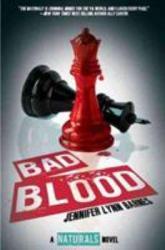
Bad Blood is about 5 teens with natural skills that lead them to work with the FBI to solve cases. In this book they are going back to look into their pasts especially the main female character to try to lead to a murderer, or multiple. I was not able to put the book down and ended up finishing it in a day. Everything comes together so nicely. All the details play into each other and I can not imagine how the author came up with such elaborate ideas that are so complex. This book is for anyone who loves the show Criminal minds because they are so similar or is looking for an amazing crime book.
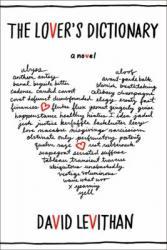
The book "The Lovers Dictionary" by David Leviathan gets a "meh" review. While the book seems like it'll be a hopeful love story, it actually spins a web of lies and heartbreak. Each chapter is a new word, and the chapter explains the definition, through a story. While this seems to be a cool idea, it was not well planned out in this book. Sudden changes in setting, as well as changes in the timeline, leave this book quite confusing. It makes you want to get entranced by the book, but also makes it difficult to do so. Had the author better explained both the timing and the reasoning behind the flashbacks of sorts, the story would have been better able to comprehend and relate with. The story also has these thought-changing scenes that make no sense. One second the narrator is madly in love and very happy about it, and the next he is broken-hearted and considering leaving his partner. The constant back and forth is difficult to follow and honestly quite frustrated. I think the idea of the book was a great idea, however, I do not believe the author knew quite how to plan it out.
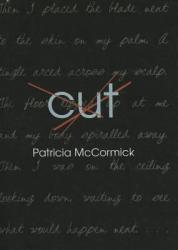
This book tackles some very tough topics in very realistic and accurate ways. Main character Callie has been placed into a residential treatment center, shortly after her family discovers that Callie had begun to use self-harm to cope with many issues. The stress of being in this facility, as well as familial and mental stress, leads Callie to silence. Acting on selective mutism, Callie chooses to stop talking. Many people try, and yet fail, to help her open up and speak. Through the book, from memories and dialogues that run through Callie's brain, we discover that Callie has an extremely stressful home life that has become detrimental to her mental health. This book speaks on the reality of mental health facilities in America, as well as the type of home life that many live and suffer through silently. This story faces the reality of self-harm and mental illnesses. These topics are very uncomfortable for many, and almost taboo, but "Cut" breaks through that and breaks down the walls of real-life issues, and progress through mental health issues.
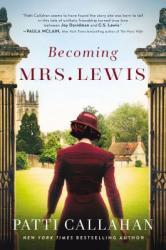
Becoming Mrs. Lewis, by Patti Callahan, is the fictionalized retelling of C.S. Lewis and Joy Davidman's unlikely love story. It is based around the correspondence between the two, their writings, and Joy's copious love sonnets. While C.S. Lewis is primarily known for his works of literature, his relationship with Joy was just as big--if not bigger--a part of his life as his work. The story is told entirely from Joy's perspective, with bits of correspondence sprinkled throughout her narration. Right out of the gate, Joy has an epiphany one night while living in a house in upstate New York with an abusive husband and two small sons. This holy experience leads to Joy's conversion to Christianity; then, searching for answers about faith, she comes into contact with the renowned author C.S. Lewis and they begin corresponding frequently. Eventually, Joy makes the choice to go to England because of health problems and her husband's abuse, and meets C.S. Lewis (whom she calls Jack) for the first time. The rest of the book is an agonizingly slow journey to their marriage, which happens under unfortunate circumstances at the very end.
I had awfully mixed feelings about this book. I was interested in learning more about the life of C.S. Lewis, but instead I received the sad, angsty story of Joy Davidman, and unfortunately, Joy Davidman--as portrayed by Callahan--is not a likeable character. She is impulsive in nearly all her actions, self-pitying and self-motivated (as exhibited by the fact that she leaves her two young sons in an abusive household while frolicking off to Europe), naive, obnoxious in much of her dialogue, excruciatingly desperate to be loved, and altogether irritating. However, I did like Jack's character, and overall there was some good character development. The plot itself was slow and redundant: dialogue dragged and nearly every conversation felt the same to me; I often found myself bored. It seemed like Callahan was running the plot in circles without ever achieving a climax. Also, as the story took place over several years in real life, Callahan was forced to glaze over several months at a time, never really going in depth about what took place in between Joy and Jack's meetings. As for the writing style itself--nothing to compliment. Callahan's syntax was unengaging and at times poorly executed, the story lacked imagery, and the use of British slang seemed forced, coming from an American author. Over the course of the book, Joy's feelings for Jack develop more quickly than his for her, and I couldn't help feeling disturbed by her physical attraction to a man 17 years older than her. Callahan should've backed off on Joy's excessive, out-of-the-blue thoughts of physical desire--they were disturbing and took away from Jack and Joy's friendship.
I believe the love story of C.S. Lewis and Joy Davidman would've been best left alone. While Callahan's novel is historically accurate, the fictionalization of intimate details and dialogue that belonged to the real Joy and Jack in their time did not sit well with me. I appreciated Callahan's inclusion of literary history--especially learning about Jack's life and how
it influenced his writing--and the last fifty pages of the book redeemed itself slightly, as the characters' growth was revealed and some important life lessons shone through. Occasionally I was immersed in the story and
rooting for Joy, but the mundane, repetitive, boring moments overshadowed those, and Callahan's Joy was not the female character I'd hoped she would be. I wouldn't call this book a romance, because it's simply desperation on
one side and friendzoning on the other until a dire situation wakes up the latter party to reality. Becoming Mrs. Lewis did not do it for me, and I don't recommend it unless you immensely enjoy poorly-written, many-liberties-taken fictionalized accounts of famous historical figures' lives. I believe Joy Davidman and C.S. Lewis were probably wonderful individuals in reality, and I wish Callahan had done them justice.
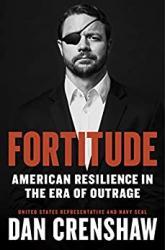
This book is fantastic! Dan Crenshaw offers brilliant advice on mental toughness and how to combat the outrage culture with critical thinking. Crenshaw's methods are simple, easy to practice, and are what is missing in today's society. Written from his life experiences of being a Navy SEAL and United States Congressman, Crenshaw makes this book relatable and applicable to everyone's lives. Crenshaw also cites many articles, studies, and medical experts to backup his advice. I highly recommend this book to anyone who wants to become a well-informed voter, contributing citizen, or successful person.
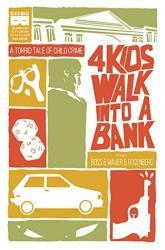
4 Kids Walk Into a Bank follows a group of four middle school kids planning a bank robbery. Throughout the story the characters face the prospect that right and wrong may not be as binary as their games make them out to be. This graphic novel does the Goonies, Stand by Me, and Stranger Things middle school group trope beautifully well, with notes of comedy and friendship. Although the story maintains a dark tone, Rosenberg includes brilliant humorous moments that add levity to the story and highlight the friendship between each of the characters. The art by Tyler Boss is phenomenal, completely immersing the reader into the book and constantly leaving us in awe. Each page is a masterpiece perfectly encapsulating the tone of the book and adding to the brilliant pacing of the book. The timing of each word and picture are masterfully placed becoming almost Wes Anderson. This graphic novel has easily become my all time favorite stand alone graphic novel and gets better each time I read it.
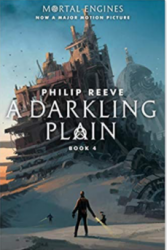
With the way Infernal Devices ended, I immediately knew there had to be a fourth book to finish this unique series. Few books resolve their respective series as well as A Darkling Plain does, which I can appreciate. In fact, the final epilogue was as beautiful as it was tragic. Along the way, the little loose ends tie up nicely so that all the characters are given some closure—whether or not they deserve it.
I wasn't wild with the time-skip tactic that Infernal Devices used since it basically split this series into two larger stories. Mortal Engines and Predator's Gold covered Hester and Tom's relationship, while the last two books covered their daughter's adventures. Of course, I was shocked with the ending of Infernal Devices, which did get an explanation in this book, even if it lessened the impact of that plot twist. That being said, some of the characters' fates were foreshadowed well ahead of this book, which left their ultimate fate somewhat anti-climactic.
Overall, I enjoyed how the idea of mobile cities eating each other in an evolutionary survival of the fittest came to its logical conclusion in this book. It's such a peculiar concept that was thoroughly explored in the previous three volumes so that this book could wrap up this phase in the post-apocalyptic timeline with enough room to give some hope for a future. After all, I have yet to run across a science fiction series that combines so many tropes so well and manages to conclude its complicated plotlines in such a satisfying way.
A satisfying ending of a unique series, I give A Darkling Plain 4.0 stars out of 5.
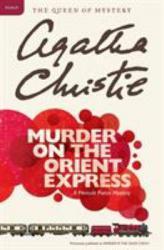
Murder on the Orient Express is the story of detective Hercule Poirot who is taking the train the Orient Express when a man gets murdered on board. With the help of the the doctor and other staff members on board, Poirot plans to solve the murder before the train arrives at its destination and the murder is free to walk away.
This book is very well written and has many plot twists so you are constantly looking forward to what comes next. I would recommend this book to anyone who likes a good mystery. It is fairly easy to understand and could be easily read by anyone 5th grade and up.
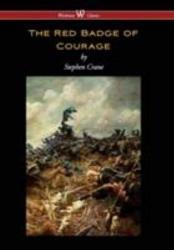
The Red Badge of Courage is really not a great book. It is centered around the Civil War and tells the story of Henry, a Union soldier who leaves his farm to go fight. During the war he cannot make up his mind to run away from the field or stick with his friends in battle. While some might find the book interesting, personally it just dragged on and on. Sometimes it would go really in depth into a battle or a part of the story that was not very important and in others it would just gloss over a major part that you needed to understand. I would not recommend this book to anyone as it is hard to understand and is not very well written.
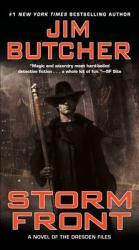
Jim Butcher brings to life a world filled with magic. This does not save Harry Dresden from very real problems - keeping up with rent, car troubles, and more. This gives the story a grounding in reality that makes aspects of it relatable, despite its focus on the supernatural. Dresden is stubborn, but he always tries to do the right thing. As he tries to solve multiple homicides and searches for a missing person, he finds there is something darker going on than he first believed. His race against the clock adds a thrill that makes the book hard to put down.
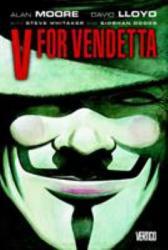
V for Vendetta follows V as he fights against an authoritarian government and trains a successor. The book questions the cost of losing art, literature, and beauty in an attempt to create complete control over society. The art adds another dimension to the story, and the colors used in V's house compared to the outside world emphasize the underlying message. V's character is captivating because he possesses such knowledge and culture yet brings destruction. This leads readers to consider the necessity of violence to preserve culture. V's mask holds similarities to Guy Fawkes', and certain actions between the two are also similar, adding historical parallels to the story. V's strong ideals and actions to back them up lead him to become the face of a revolution but at what cost?
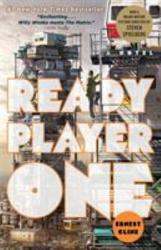
Ready Player One, a book by Ernest Cline, takes place in a dystopian future in 2045. The majority of the population spends most of their time inside a massive VR MMOSG, massively multiplayer online simulation game, called the Oasis. When the billionaire creator of the Oasis died, he left clues for an Easter Egg that he had hid in his game, and the first one who finds it gets his entire fortune. This story is about the adventure of Wade Watts, a kid from the Stacks in Columbus, Ohio, as he searches for that egg. This book is amazingly written, and you will be wanting to know what happens next as you read. You may have seen the movie, but the book is a masterpiece, the story is much richer, and definitely worth the read!
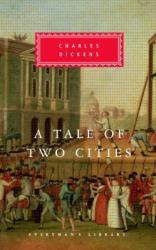
A Tale of Two Cities is a captivating book. Set during the period leading up to and during the French Revolution, the book details how the French aristocracy and the French Revolution affected the rich and the poor through the stories of Charles Darnay and Alexandre Monette. It also shows the angry and vengeful side of the Revolution through the Defarge's and their wine shop. A scene where a wine cask is dropped demonstrates the desperation and poverty experienced by the citizens of Paris that led to the anger behind the revolution. Dickens also brings the book to life through life-like characters that emotionally invest readers in the story. Alexandre Monette exhibits fatherly care for his daughter, yet he also struggles to deal with his time in prison, leading him to rely on his daughter for support. Sydney Carton contains likeable aspects mixed with relatable flaws that make him instantly lovable. Dickens expertly connects each scene to develop the story and foreshadows multiple aspects of the climactic ending throughout the book.
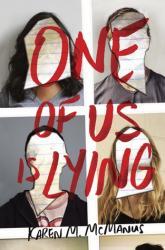
One of Us is Lying is a mystery novel about four high school students who are suspected for the murder of their classmate. Bronwyn, Addy, Cooper, Nate, and Simon go into their after school detention following a normal day at school, but the events that happened after weren't so normal. Simon, the outcast and the creator of the high school's gossip app, has been murdered and the other students in detention claim they know nothing. Yet after his murder, the posts on his gossip app don't stop, eventually revealing some shocking things about the suspects. Bronwyn, Addy, Cooper, and Nate decide to join forces and find out the truth behind Simon's murder.
Overall, this book was really good. I would have given it 5 stars but I feel like the description (from the book) is a little misleading. The book focuses on their lives after the murder of Simon Kelleher and not as much of them trying to solve the murder. While I really do like the way it explains the details of their lives, I just found it a bit misleading. Other than that, the book is great. I absolutely love the character development in this novel.
In the beginning Addy is what you might call a "dumb blonde" but later on she becomes much more independent and her character develops in many ways. I also really liked the plot twists, they completely blew me away! I can't reveal much more than that but I truly didn't expect some of the things that happened, to happen.
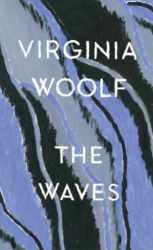
The Waves is an astounding novel by Virginia Woolf, known as her most experimental work. The novel is split into nine sections, each separated by a short passage describing the sea at a certain time of day; as the book progresses, these intercalaries move from sunrise to sunset to mirror the lives of the characters as they age in the succeeding chapters. The Waves is unique because Woolf uses a stream of consciousness writing style to capture the thoughts of her characters rather than dialogue, enhancing her characterization and creating her own take on fiction. The novel follows the lives of six friends, beginning with their childhood together. It explores the depths of human thought and as they grow older, and dives into questions of mortality and purpose. Each of the characters is starkly different from the rest, shedding light on the complexities of life through multiple perspectives.
Woolf does an amazing job of creating emotional depth in this short yet vast novel. I found everything from her descriptions of the ocean and the earth to the nuances of ordinary life to be very beautiful. Woolf's questioning of existence through her characters led me to consider my own life, and I found myself often completely immersed in her vivid imagery and rich writing style.
This novel is realistic in that the characters are all flawed in some way, and have their own fears and dreams. The illumination of their internal conflicts through stream of consciousness makes the book very personal and intimate, which is a rare experience.
I can't even begin to do justice to The Waves, so I strongly recommend that all young adults and adults read it for themselves. It has been one of of the most thought-provoking books I've ever read, and there is something in it for everyone. Virginia Woolf's The Waves is a wise commentary on humanity and a magnificent work of art; it should be read to be believed.
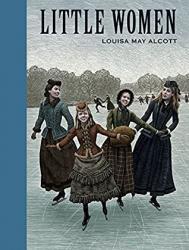
Louisa May Alcott's well-known classic Little Women tells the story of four sisters in the time of the Civil War: Meg, who longs for a life without poverty; Jo, a tomboy and writer; Beth, quiet and kind; and Amy, who has elegant taste in art and life. These four girls, with the help of their mother, learn lessons that help them carry their burdens with thankful hearts and lean on each other throughout the trials they face. The novel spans ten years, and follows the lives of the March family and their friends. It highlights the small joys of childhood, adventures at home and abroad, growing up, loss, and falling in love.
Alcott's writing is insightful, touching, and humorous; she draws the reader in emotionally and offers her wisdom generously. Little Women is an important narrative of ordinary life which both amuses and grieves, and should be read by all teens. Not only does it put life into perspective; it also relates to teenagers today despite being written nearly two-hundred years ago. Any audience will be able to connect with at least one of the March sisters--especially young women. Meg, Jo, Beth, and Amy become as dear to readers as family throughout their journey to adulthood. If you enjoy heartwarming stories and historical fiction, this book is for you!
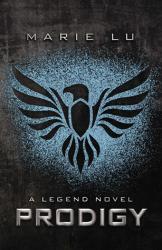
Prodigy is the second book in the Legend trilogy and it is just as enticing as the first. I am obsessed with this plot and again would recommend it to anyone because of the intense romanticism and thrilling fights. Not to forget, the Republic (where the main character lives) is undergoing a pandemic of its own virus, which very much connects to the issues we have faced in 2020 and now 2021 as well. This book wouldn't make sense if you read it before the first book in the series, but it has gorgeous writing nonetheless. There are so many layers to this book, especially because former background characters are being included and are now essential to the storyline. With many book series, the writing starts to lose interest or just depreciates, but absolutely not in this series. And after this book, it gets even more alluring.
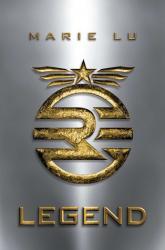
I read the first book of the Legend trilogy (Legend) for a school summer reading assignment, but I fell in love with it and finished the series of books. I would recommend this book to anyone because it is easy to understand, and very entertaining. This was written from the first-person point of view, but each chapter switches off between the two main characters, who are also the novel's love interests. This unique writing style allows the readers to get even more background info than if it was told by one single character. Not only is there an interesting romance twist, but there are thrilling fighting scenes and plenty of unexpected deceit. This is perfect for any gender and anyone from the age of 12+. When reading, I enjoyed this with another friend who also fell in love with the plot and read the whole trilogy, so if thrilling romance books are your thing, try this book.
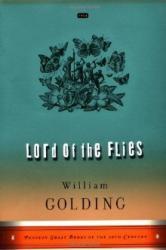
This book begins with the crashing of a schoolboy's evacuation plane, which leaves them stranded on an island and left to fend for themselves. It is rich in figurative language, although it may be hard for some people to understand because it is written in old-style English. Symbolism is a strong component as well, considering that this book is an allegory, so paying attention to every detail and symbol is important. The author wrote the characters to display a mental change, which emphasizes how the lack of civilization transforms these young schoolboys into feral beasts. The ending of this novel sums it up perfectly and explains any actions that might've confused the readers when enjoying this book.





 Ruth Holley Library will be temporarily closed for approximately one week starting Mon., Dec. 2 to complete roof repairs.
Ruth Holley Library will be temporarily closed for approximately one week starting Mon., Dec. 2 to complete roof repairs.